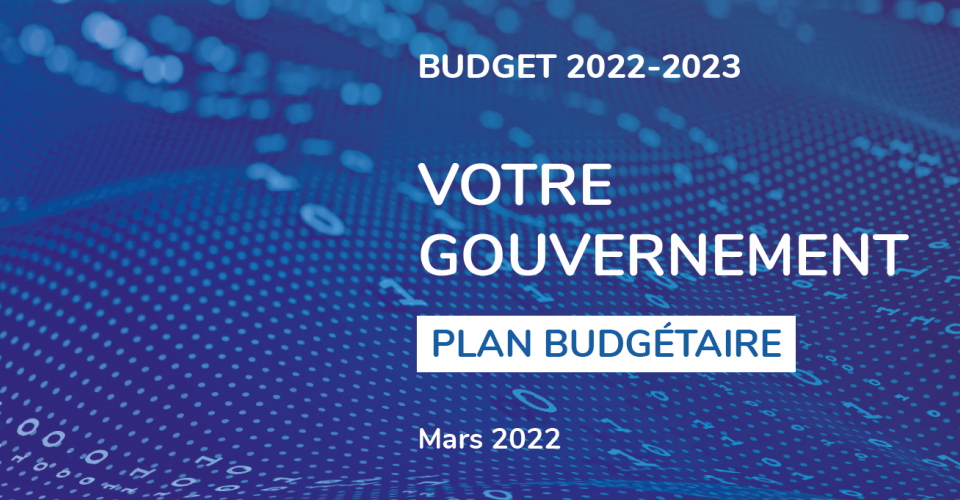Quebec 2022-2023 budget: a missed opportunity to improve access to services and to support people with disabilities

March 22, 2022
The Quebec Intellectual Disability Society participated in the 2022-2023 provincial budget lock-up. Expectations were high with the government, and unfortunately, this budget presents a missed opportunity to improve access to services.
The pandemic has exacerbated deep-seated issues in the health and social services network and other areas of the Quebec government’s action. Yet the government has chosen instead to produce an electioneering budget with populist measures. These measures will not help those who are most in need, and will not meet the critical needs of individuals and families. It should be remembered that people with disabilities are systematically more likely to live in poverty and to lack access to employment. The needs in the health and social services network are also critical.
The Quebec Intellectual Disability Society will continue to call for massive reinvestment the in the area of intellectual disability in order to meet the needs of individuals and families. The Society’s deep commitment to universal, quality public services remains at the heart of its action, in defence of the rights of individuals and their families, and more broadly of all marginalized populations.
Analysis of the budget by topic
Financial assistance to individuals and families
The announced amount of $500 per person is clearly insufficient to really help the lowest income households. The Minister of Finance claims that he used a basket of goods and services worth $25,000 to define the level of support to be given to individuals, but it is important to note that people on last resort financial assistance programs are not even close to receiving this amount per year.
Inflation and the rising cost of living will hit low-income people harder. Last-resort financial assistance benefit amounts should be increased immediately and not be delayed until accurate inflation figures are available. The ministry has the capacity to do so, since the number of recipients of social assistance and social solidarity programmes has been steadily decreasing for more than five years. In fact, the budget decrease for last-resort financial assistance plans will reach a record $207M this year. The Quebec government should immediately use these funds to increase the benefits of all people receiving last-resort financial assistance.
In addition, the Quebec Intellectual Disability Society is asking the Quebec government and the Minister of Labour, Employment and Social Solidarity to launch a plan to reform social assistance and social solidarity programs, with a reform of the Individual and Family Assistance Act by 2026.
Housing
Although announcements have been made regarding housing budgets, it is clear that very little money is likely to be invested in housing resources for people with disabilities.
As for the Ministry of Health and Social Services, its goal is to pursue the “development of 2,600 places in seniors’ homes and alternative living environments by March 31, 2023”. No details are provided regarding these facilities, but it should be remembered that people with disabilities should never be forced to live in CHSLD-type institutions, even if the intensity of services they require is considerable.
Yet, the housing needs for these populations are enormous: waiting lists are several years long and very little funding is available for the creation of alternative living environments by and for communities.
The use of increasingly large and controlled living environments is a step towards a return to institutions, and it is important that a community shift be made in housing and living environments.
People who are caregivers
It should be noted that the Action Plan for the Support of Caregivers is being funded to the tune of $125.3M over five years. This money is expected to be used to fund respite and support for caregivers. This is good news.
The increase in the amount of the tax credit for caregivers is also good news.
Funding for non-profit organizations
The additional funding to support the mission of non-profit organizations is also noteworthy. With an additional investment of $1 billion over five years, the Quebec government aims to increase funding by more than 30% over 2020-2021.
This is a good start, but mission funding will need to continue to increase.
Justice
The Society is dismayed to see that very little investment has been announced to better support people living on the margins of society in the justice system, and in strengthening the social safety net in general.
The shortcomings of the Curateur public du Québec, highlighted in February, have shown that the Quebec government is failing to adequately protect and assist those most marginalized in society. Yet, only $18M over five years was announced to “enhance the delivery of services to the disabled”. This is not enough. Action must be taken more quickly and decisively.
Interdepartmental intervention is necessary and the fact that no plan seems to have been developed to achieve this is astonishing.
Health and social services
This budget does not address the needs of people with intellectual disabilities.
The projected increase in the Intellectual Disability and Autism Spectrum Disorder budget amounts to 8% for the period 2021-2022 to 2022-2023, with a projected budget of $1.3G in 2022-2023. Despite all of this, individuals and families have seen no improvement in terms of services in recent years. Worse, a significant deterioration in services occurred during the pandemic. Thus, despite an increase in the budgets for intellectual disabilities and autism spectrum disorders, the question remains as to how the money is actually being spent, given that individuals and families are not seeing any improvement in services and that waiting lists are only increasing.
The Quebec Intellectual Disability Society continues to call for significant reinvestment in services for individuals and families. These services must be public, universal and of high quality. The government must act now.
